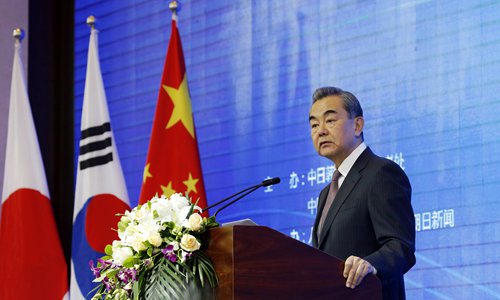HOME >> OPINION
China, South Korea and Japan can forge cooperation based on new technology
By Liu Junhong Source:Global Times Published: 2019/8/21 20:53:40

Chinese State Councilor and Foreign Minister Wang Yi speaks during the opening ceremony of the International Forum for Trilateral Cooperation in Beijing, China on May 10, 2019. Photo: IC
The ninth meeting of foreign ministers of China, Japan and South Korea kicked off in Beijing Wednesday to discuss the future trilateral cooperation and exchange views on international and regional affairs.
Seoul-Tokyo ties are falling into "cold politics, freezing economics." The China-US trade disputes are also having a negative influence on Northeast Asia. Therefore, China-South Korea-Japan trilateral cooperation is facing unprecedented difficulties and challenges. As this year's chair for China-Japan-South Korea trilateral cooperation, China should seek fresh areas of, and approaches to, cooperation, which can help ease regional tensions and promote regional economic developments.
Twenty years ago, to jointly deal with crises, leaders of China, South Korea, Japan and Association of Southeast Asian Nations (ASEAN) institutionalized the ASEAN Plus Three cooperation framework. They have formed an industrial and value chain and cultural circle with unique Asian features and have developed a cooperation model among different social systems, development levels and civilizations. As the core of cooperation in East Asia, Beijing, Seoul and Tokyo should devote more to defending multilateral, open and free trade systems and resist anti-globalization and trade protectionism.
The economic outputs of these three East Asian countries are considerable. If China, South Korea and Japan establish a free trade zone, it will play a pivotal role in international trade.
The three countries have not only signed free trade agreements (FTA) with ASEAN and its key members under the ASEAN Plus Three framework, but also with countries beyond the region, which has effectively facilitated international free trade. Because of signing FTAs with China, the US and Europe, South Korea has significantly increased the expansion of free trade. Japan has also signed several bilateral economic partnership agreements and has concluded the EU-Japan Economic Partnership Agreement and the Comprehensive and Progressive Agreement for Trans-Pacific Partnership.
All three countries are proactively advancing the Regional Comprehensive Economic Partnership (RCEP) and negotiations on China-Japan-South Korea FTA. The joint efforts of China, Japan and South Korea to uphold free trade have effectively defended the authoritative position of the World Trade Organization (WTO) and the multilateral trade system led by WTO.
These three neighbors have become one another's major trading partners. Asian trade with China, Japan and South Korea at its core has advanced rapidly. As exports from Asia and Europe account for a large share of world trade, the China-proposed Belt and Road Initiative (BRI), a joint development program that extends across and beyond the Eurasian continent, has become the heartland of global trade. The BRI, which is leading investment and development, will become a new trend of globalization.
On August 14, the yield on the 10-year Treasury bonds temporarily dropped below that of a two-year rate for the first time since 2007. It shows the expected rate of return on investments in the US market is no longer attractive to the world.
The massive investment demands from the BRI will create an unprecedented investment effect, which will determine that Eurasia, rather than the other side of the Pacific, is the leader in regional cooperation.
With the dramatic development of new technologies such as 5G, artificial intelligence, Internet of Things, big data and simultaneous reform by China, Japan and South Korea, technological and institutional innovations are running neck and neck and their new technology and industry are leading the world. Relying on RCEP's large market of about 3.5 billion people, digital trade would be boosted in this region, transforming the digital economic center to Asia. China, Japan and South Korea should make long-term plans to meet the demand of digitization in economy and trade.
The author is a research fellow of the China Institutes of Contemporary International Relations. opinion@globaltimes.com.cn
Posted in: OBSERVER